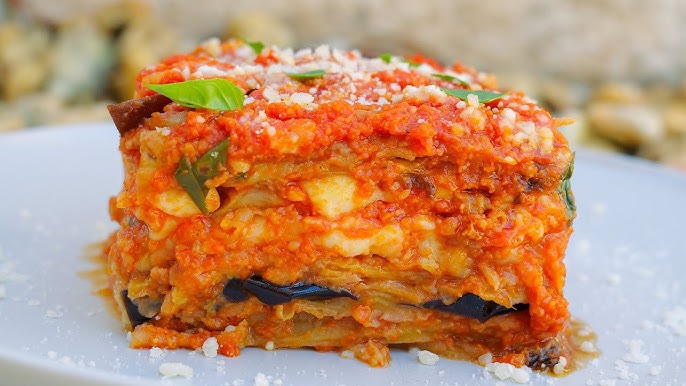Eggplant Parmesan Recipe: Eggplant Parmesan is a beloved Italian-American classic known for its crispy, breaded eggplant slices layered with marinara sauce and gooey cheese.
In this guide, we’ll take you through each step to make this hearty, flavorful dish right in your kitchen.
Origin and Popularity of Eggplant Parmesan
Eggplant Parmesan, or “Melanzane alla Parmigiana” in Italian, originated in southern Italy, where fresh ingredients and vibrant flavors are central to the cuisine. Over time, it’s become a comfort-food staple worldwide, known for its satisfying layers of crispy eggplant, tomato sauce, and melted cheese.
Why You’ll Love This Recipe
This Eggplant Parmesan recipe is simple but packed with flavor. The eggplant is breaded and cooked to perfection before being layered with savory marinara sauce and topped with melted cheese. It’s a crowd-pleaser that’s ideal for family gatherings, weeknight dinners, or even as a meatless alternative for special occasions.
Ingredients Needed for Eggplant Parmesan
Fresh Ingredients
- 2 large eggplants
- 4 cups marinara sauce (store-bought or homemade)
- 1 cup grated Parmesan cheese
- 2 cups shredded mozzarella cheese
- Fresh basil leaves (optional, for garnish)
Pantry Ingredients
- 1 cup all-purpose flour
- 2 cups breadcrumbs
- 4 large eggs
- Salt and pepper
- Olive oil for frying
Optional Ingredients for Extra Flavor
- Freshly grated Romano cheese for a sharper cheese flavor
- Garlic powder or Italian seasoning in the breading for extra flavor
Preparing the Eggplant
Selecting and Slicing the Eggplant
Choose eggplants that are firm, glossy, and free from bruises. For slicing, cut the eggplant into ¼-inch rounds, making sure they are uniform in thickness for even cooking.
Salting the Eggplant
Why Salting the Eggplant Is Important
Salting helps remove excess moisture, preventing the eggplant from becoming too mushy. It also helps reduce the slight bitterness that some eggplants have.
Tips for Perfect Salting
Sprinkle salt generously on each side of the eggplant slices and let them sit for about 30 minutes. Once they release moisture, pat them dry with a paper towel. This step ensures a crispy texture when fried or baked.
Bread Coating for Eggplant
Ingredients for Breading
For breading, you’ll need all-purpose flour, beaten eggs, and breadcrumbs. For added flavor, try adding a pinch of Italian seasoning or garlic powder to the breadcrumbs.
Step-by-Step Breading Process
- Dredge: Coat each slice of eggplant in flour, shaking off any excess.
- Dip: Dip the flour-coated eggplant into the beaten eggs, ensuring full coverage.
- Bread: Press each slice into the breadcrumbs, ensuring a thick, even layer.
Cooking the Eggplant
Frying vs. Baking the Eggplant
Pros and Cons of Frying
- Pros: Frying gives a crispy and golden coating, which adds flavor.
- Cons: It uses more oil, adding extra calories.
Pros and Cons of Baking
- Pros: Baking is a healthier alternative with less oil.
- Cons: It may result in a slightly less crispy texture.
Tips for Crispy Eggplant
If frying, heat oil in a skillet over medium-high heat and fry the eggplant in batches to avoid overcrowding. For baking, place the breaded slices on a wire rack over a baking sheet to help with even browning.
Assembling the Eggplant Parmesan
Preparing the Sauce Layer
While the eggplant is cooking, heat your marinara sauce on the stove. For a rich, homemade flavor, add a pinch of Italian herbs, a dash of red pepper flakes for a hint of spice, and a clove or two of crushed garlic. Let it simmer for a few minutes to enhance the depth of flavor. Using a good-quality marinara sauce will make a big difference, so if you’re using store-bought sauce, choose one with minimal added sugar and fresh ingredients.
Layering Technique for Maximum Flavor
The layering process is crucial for flavor and texture, and it’s what makes Eggplant Parmesan so deliciously comforting.
- First Layer of Sauce: Start with a thin layer of marinara sauce on the bottom of a baking dish. This keeps the eggplant from sticking and ensures every bite has that rich, tomatoey flavor.
- Add Eggplant: Place a single layer of breaded eggplant slices over the sauce. Try to cover as much of the surface as possible without overlapping.
- Add Cheese: Sprinkle a mix of mozzarella and Parmesan cheese over the eggplant. This cheese layer melts and binds the eggplant, sauce, and additional layers together.
- Repeat Layers: Repeat the process (sauce, eggplant, cheese) until you run out of ingredients, usually ending with a layer of cheese on top.
Adding Cheese and Seasoning
For a little extra flavor, add freshly grated Parmesan cheese along with the mozzarella. Sprinkle a few torn basil leaves between the layers if you like, and finish the top with an extra sprinkle of Parmesan, mozzarella, and even a dash of Romano cheese if desired. This top layer of cheese will brown beautifully as it bakes, adding a golden, bubbly finish to the dish.
Baking the Eggplant Parmesan
Recommended Bake Time and Temperature
Preheat your oven to 375°F (190°C). Bake the assembled Eggplant Parmesan for about 30-40 minutes. Keep an eye on the cheese topping to ensure it doesn’t overbrown. You want it to be golden, bubbly, and slightly crisp around the edges.
Tips for Perfectly Baked Eggplant Parmesan
To prevent a watery dish, make sure your sauce isn’t too thin and that the eggplant has been properly salted and patted dry before cooking. Cover the dish loosely with foil for the first 20 minutes of baking to keep the moisture in, then remove the foil for the final 10-15 minutes to let the cheese get a lovely, golden-brown color.
Serving Suggestions for Eggplant Parmesan
Side Dishes That Complement Eggplant Parmesan
Eggplant Parmesan pairs wonderfully with a variety of sides. For a classic Italian meal, serve it with spaghetti or another pasta tossed in marinara sauce. You can also opt for a fresh Caesar salad or a simple green salad dressed with olive oil and balsamic vinegar. Garlic bread is another delicious addition, perfect for sopping up any extra sauce on your plate.
Garnishing and Presentation Tips
For a touch of color and added freshness, garnish the finished dish with fresh basil leaves. A sprinkle of freshly grated Parmesan or a drizzle of olive oil can also add a professional touch. Serve the dish directly from the baking dish for a rustic presentation, or transfer to individual plates for a more elegant presentation.
Storing and Reheating Leftovers
Storing in the Refrigerator
To store leftovers, let the dish cool completely, then cover it tightly with plastic wrap or transfer it to an airtight container. It will keep well in the refrigerator for up to 4 days.
Freezing Eggplant Parmesan
For longer storage, you can freeze Eggplant Parmesan. After cooling, transfer it to a freezer-safe dish, cover tightly with plastic wrap, and then with foil. Frozen Eggplant Parmesan can last up to 3 months. When ready to enjoy, thaw it overnight in the refrigerator before reheating.
Reheating Tips for Best Results
To reheat, place leftovers in a preheated oven at 350°F (175°C) and bake for 20-25 minutes, or until heated through. Cover with foil to retain moisture, then remove the foil for the last few minutes to let the cheese topping crisp up.
Tips and Tricks for the Perfect Eggplant Parmesan
Common Mistakes to Avoid
- Skipping the Salting Step: This is essential for flavor and texture.
- Using Too Much Sauce: This can lead to a watery dish. Use just enough to cover each layer lightly.
- Overcrowding When Frying: If frying, cook the eggplant in batches to maintain a crispy texture.
Tips for Adapting to Dietary Preferences
For a vegan version, substitute dairy-free mozzarella and Parmesan, and use a flax egg (flaxseed mixed with water) for the egg in the breading. For a gluten-free option, use gluten-free breadcrumbs and flour in the coating.
FAQs about Eggplant Parmesan Recipe
Can I make Eggplant Parmesan vegan?
Yes! Replace mozzarella and Parmesan with vegan cheese alternatives and use a flax egg or aquafaba in place of the regular egg for the breading.
How do I make Eggplant Parmesan less soggy?
Salting the eggplant and patting it dry helps reduce moisture. Avoid adding too much sauce between layers, and let the eggplant cool slightly before assembling.
Can I use different types of cheese?
Absolutely! Try adding Romano cheese for a sharper taste or fontina for a meltier texture. Mixing cheeses can add complexity to the dish.
Is it possible to skip breading the eggplant?
Yes, you can skip the breading to reduce calories, although the dish will have a different texture. Baked or grilled unbreaded eggplant works well as a lighter option.
What can I serve with Eggplant Parmesan?
This dish goes well with pasta, a simple green salad, or garlic bread for a complete Italian-inspired meal.
Conclusion
Eggplant Parmesan is a dish that’s worth the effort, with each layer bringing rich flavors and comforting textures. By following these steps, you’ll create a meal that’s perfect for any occasion—savory, satisfying, and guaranteed to impress. Enjoy!



